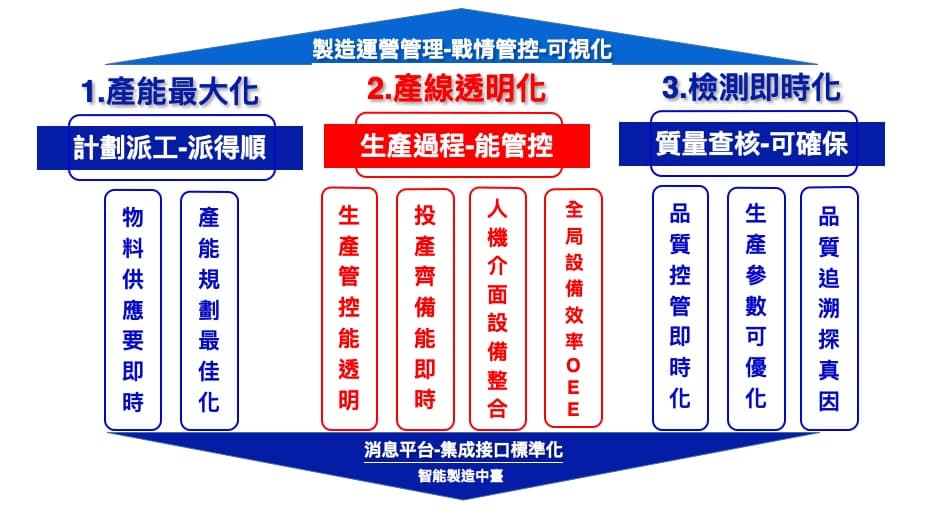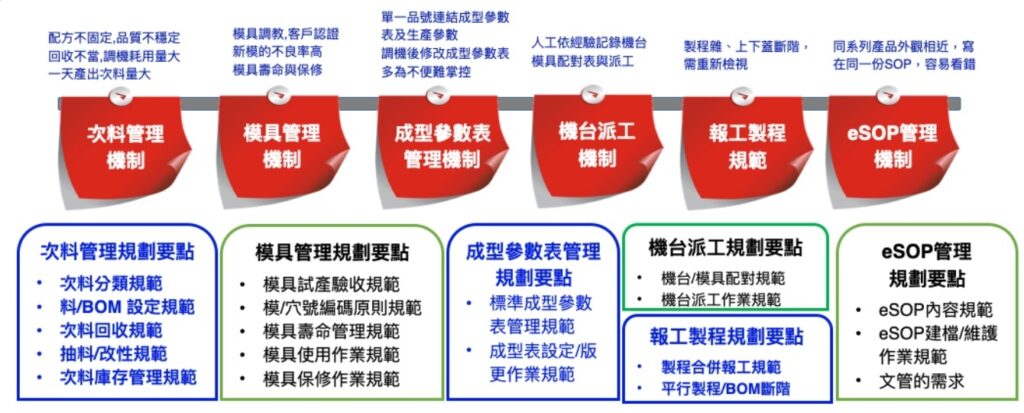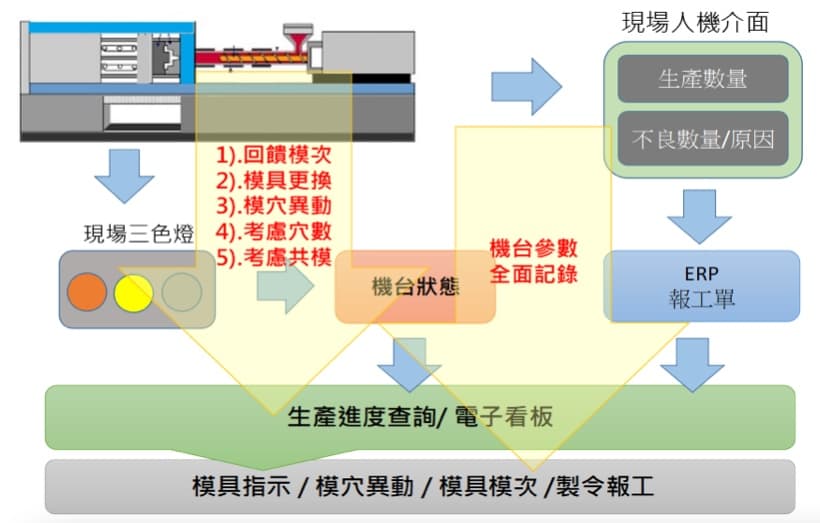การฉีดพลาสติกแบบแยกส่วนวิธีการแก้ปัญหาในอุตสาหกรรม


อุตสาหกรรม ความท้าทายในการบริหารจัดการ
การตอบกลับคำสั่งซื้อต้องรวดเร็ว กำหนดส่งสั้นและแม่นยำ ปรับเปลี่ยนตามความต้องการจำนวนน้อยและหลากหลาย ราคาสมเหตุสมผล คุณภาพดี คุ้มค่า
อิทธิพลของแนวโน้มการผลิตอัจฉริยะต่ออุตสาหกรรม
ยุคของการปรับแต่งตามความต้องการจำนวนมากมาถึงแล้ว โหมดการดำเนินงานจำนวนน้อยและหลากหลายกลายเป็นเรื่องปกติ (ผลิตภัณฑ์มีความหลากหลาย สั่งซื้อจำนวนน้อย การจัดการสินค้าคงคลัง ความเร็วในการจัดส่ง การผลิตเป็นชุดเล็ก) การเพิ่มขึ้นอย่างมากของผลผลิต ข้อได้เปรียบด้านต้นทุนการดำเนินงานแบบดั้งเดิมไม่มีอยู่อีกต่อไป (ผู้ผลิตในสหรัฐอเมริกา ยุโรป และญี่ปุ่นกลับสู่การผลิต ผู้ผลิตที่มีข้อได้เปรียบภายหลังก้าวกระโดดข้ามต้นทุน) เทคโนโลยีการรวมระบบเสมือนจริงและโลกแห่งความเป็นจริงมีความสมบูรณ์ การเร่งความเร็วอย่างเต็มที่ของวงจรชีวิตผลิตภัณฑ์ทั้งหมด (การพัฒนาผลิตภัณฑ์ การผลิตตัวอย่าง การผลิตจำนวนมากอย่างเป็นทางการ การส่งมอบคำสั่งซื้อ การลดระยะเวลาการรีไซเคิลผลิตภัณฑ์) การเชื่อมโยงข้อมูลทั้งภายในและภายนอกอย่างเพียงพอ การยกระดับที่ครอบคลุมของการผลิต การดำเนินงาน และการบริการ (การพัฒนาร่วมกัน การเชื่อมโยงข้อมูลการดำเนินงาน ประวัติทั้งหมด บริการแบบบูรณาการ อุปทานที่กำหนดเอง)

การใช้วัสดุไม่ชัดเจน
การขาดการจัดการพวยกา: การจัดการการรีไซเคิลไม่ถูกต้อง การคำนวณไม่แม่นยำ ประเภทวัสดุที่ซับซ้อน: วัสดุมีหลายประเภท ปรากฏการณ์การรับวัสดุเกินและการโอนวัสดุเป็นเรื่องปกติ
ความร่วมมือลำบาก
การจัดตารางเวลาไม่ถูกต้อง: มีปัจจัยที่ต้องพิจารณามาก ข้อมูลได้มาไม่ง่าย ความต้องการไม่ตรงกัน: ความต้องการของลูกค้ามีการเปลี่ยนแปลงอยู่ตลอดเวลา
ไซต์งานไม่มีประสิทธิภาพ
กำลังการผลิตไม่สมดุล: ภาระกำลังการผลิตของเครื่องจักรและบุคลากรไม่สมดุล การผลิตระหว่างดำเนินการไม่โปร่งใส: ความคืบหน้าของการผลิตระหว่างดำเนินการไม่โปร่งใส พารามิเตอร์ส่วนใหญ่ถูกควบคุมด้วยตนเอง ไม่สามารถควบคุมความเสี่ยงได้
การจัดการอุปกรณ์ยุ่งเหยิง
การจัดการแม่พิมพ์ไม่ได้รับการนำไปปฏิบัติ: จำนวนแม่พิมพ์มีมากและการเปลี่ยนแปลงบ่อย ทำให้ยากต่อการทราบสถานะของแม่พิมพ์อย่างชัดเจน การบำรุงรักษาไม่ทันเวลา: อุปกรณ์และแม่พิมพ์ไม่ได้รับการบำรุงรักษาตามแผน ซึ่งมักจะทำให้เครื่องจักรขัดข้องหรือแม่พิมพ์ผิดปกติ ทำให้เกิดการหยุดทำงานหรือคุณภาพผิดปกติ
วิธีการแก้ปัญหาในอุตสาหกรรม

1.เพิ่มกำลังการผลิตสูงสุด: การวางแผนการจัดส่ง - จัดส่งได้อย่างราบรื่น
การจัดหาวัสดุต้องทันเวลา
วัสดุที่ไม่สำคัญสามารถกำหนดกำหนดการนำเข้าวัสดุได้ตามวันที่เริ่มต้นที่คาดไว้ของแผนการจัดตารางการผลิต
ในขณะที่วัสดุที่สำคัญควรเป็นข้อจำกัดการเริ่มต้นเมื่อจัดแผนการผลิต
การพิจารณาการจัดตารางลักษณะเฉพาะของอุตสาหกรรมพลาสติก: 1. เวลาเตรียมการ 2. เงื่อนไขการผลิตเป็นชุด 3. เงื่อนไขการใช้แม่พิมพ์ร่วมกัน
การพิจารณาเงื่อนไขการผลิตเป็นชุดของแม่พิมพ์: 1. แม่พิมพ์เดียวกัน สีเดียวกัน เปลี่ยนหมายเลขผลิตภัณฑ์ 2. แม่พิมพ์เดียวกัน สีต่างกัน 3. เปลี่ยนแม่พิมพ์
2. ความโปร่งใสของสายการผลิต: กระบวนการผลิต - สามารถจัดการได้

ระหว่างการผลิต – อุปกรณ์รวมส่วนต่อประสานระหว่างคนกับเครื่องจักรในอุตสาหกรรมพลาสติก

ระหว่างการผลิต – ผ่านส่วนต่อประสานระหว่างคนกับเครื่องจักรและป้ายอิเล็กทรอนิกส์ การตรวจสอบกิจกรรมการผลิตอย่างต่อเนื่องและการป้อนข้อมูลการรายงานการผลิตอัตโนมัติจะป้อนข้อมูลกลับไปยังไซต์งาน 1. ป้อนข้อมูลจำนวนครั้งการผลิต 2. การเปลี่ยนแม่พิมพ์ 3. การเปลี่ยนแปลงช่องแม่พิมพ์ 4. พิจารณาจำนวนช่อง 5. พิจารณาการใช้แม่พิมพ์ร่วมกัน


